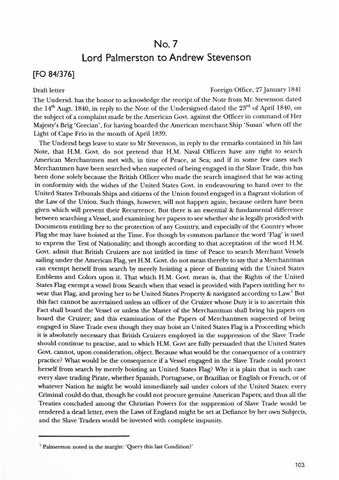No.7 Lord Palmerston to Andrew Stevenson [FO 84/376] Foreign Office, 27 January 1841 Draft letter The Undersd. has the honor to acknowledge the receipt of the Note from Mr. Stevenson dated the 14th Augt. 1840, in reply to the Note of the Undersigned dated the 23rd of April 1840, on the subject of a complaint made by the American Govt. against the Officer in command of Her Majesty's Brig 'Grecian', for having boarded the American merchant Ship 'Susan' when off the Light of Cape Frio in the month of April 1839. The Undersd begs leave to state to Mr Stevenson, in reply to the remarks contained in his last Note, that H.M. Govt. do not pretend that H.M. Naval Officers have any right to search American Merchantmen met with, in time of Peace, at Sea; and if in some few cases such Merchantmen have been searched when suspected of being engaged in the Slave Trade, this has been done solely because the British Officer who made the search imagined that he was acting in conformity with the wishes of the United States Govt. in endeavouring to hand over to the United States Tribunals Ships and citizens of the Union found engaged in a flagrant violation of the Law of the Union. Such things, however, will not happen again, because orders have been given which will prevent their Recurrence. But there is an essential & fundamental difference between searching a Vessel, and examining her papers to see whether she is legally provided with Documents entitling her to the protection of any Country, and especially of the Country who e Flag she may have hoisted at the Time. For though by common parlance the word 'Flag' is us d to express the Test of Nationality; and though according to that acceptation of the word H.M. Govt. admit that British Cruizers are not intitled in time of Peace to search Merchant Ves ls sailing under the American Flag, yet H.M. Govt. do not mean thereby to say that aM rchantman can exempt herself from search by merely hoisting a piece of Bunting with the United States Emblems and Colors upon it. That which H.M. Govt. mean is, that the Rights of the United States Flag exempt a vessel from Search when that vessel is provided with Papers in titling her to wear that Flag, and proving her to be United States Property & navigated according to Law. 1 But this fact cannot be ascertained unless an officer of the Cruizer whose Duty it is to ascertain this Fact shall board the Vessel or unless the Master of the Merchantman shall bring his pap rs on board the Cruizer; and this examination of the Papers of Merchantmen suspected of being engaged in Slave Trade even though they may hoist an United States Flag is a Proceeding which it is absolutely necessary that British Cruizers employed in the suppression of the Slave Trade should continue to practise, and to which H.M. Govt are fully persuaded that the United States Govt. cannot, upon consideration, object. Because what would be the consequence of a contrary practice? What would be the consequence if a Vessel engaged in the Slave Trade could prot t herself from search by merely hoisting an United States Flag? Why it is plain that in such case every slave trading Pirate, whether Spanish, Portuguese, or Brazilian or English or French, or of whatever Nation he might be would immediately sail under colors of the United States: very Criminal could do that, though he could not procure genuine American Papers; and thus all the Treaties concluded among the Christian Powers for the suppression of Slave Trad would b rendered a dead letter, even the Laws of England might be set at Defiance by her own Subj ts, and the Slave Traders would be invested with complete impunity.
1
Palmerston noted in the margin: 'Query this last Condition?'
103
